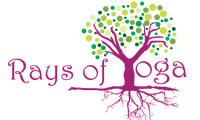Yoga therapy is an one-on-one private session taught by Shanna Hughes. The approach focuses on the whole body-mind, working with present limitations and ailments through breathing practices—specific to each individual’s needs.

Yoga therapy takes a whole-body approach, assessing each person’s overall health and working with whatever limitations are present. This approach also considers mental health, sometimes using a combination of talk therapy and movement, under the assumption that mental and physical wellness are integrated. Breathing practices are taught with different healing effects along with Individual assessments of the client, since two people with similar conditions could have very different medical histories or complicating factors that would result in a different course of treatment.
Shanna teaches private one-on-one yoga therapy classes with individuals who are challenged with physical ailments and limitations. Patients recovering from surgery, challenging diagnosis, age or mobility limitations have gained great improvement through regular sessions with Shanna.
Yoga Therapy can address chronic conditions such as:
- Anxiety and depression
- Headaches and migraines
- Back pain and neck pain
- Arthritis
- High Blood Pressure
- Joint Pain
- Obesity
- Gastrointestinal Disorders
- Chronic Stress
- Insomnia
- Chronic fatigue
- Addiction
- Heart Disease
- Respiratory Disorders
- Diabetes
The following is a list of tentative definitions of Yoga Therapy by the International Association of Yoga Therapy:
Yoga therapy adapts the practice of Yoga to the needs of people with specific or persistent health problems not usually addressed in a group class.
–Samata Yoga Center (U.S.A.) Larry Payne, Ph.D.
Read More
Yoga therapy is of modern coinage and represents a first effort to integrate traditional yogic concepts and techniques with Western medical and psychological knowledge. Whereas traditional Yoga is primarily concerned with personal transcendence on the part of a “normal” or healthy individual, Yoga therapy aims at the holistic treatment of various kinds of psychological or somatic dysfunctions ranging from back problems to emotional distress. Both approaches, however, share an understanding of the human being as an integrated body-mind system, which can function optimally only when there is a state of dynamic balance.
–Irest – Richard Miller, Ph.D.
Yoga therapy, derived from the Yoga tradition of Patanjali and the Ayurvedic system of health care refers to the adaptation and application of Yoga techniques and practices to help individuals facing health challenges at any level manage their condition, reduce symptoms, restore balance, increase vitality, and improve attitude.
–American Viniyoga Institute Gary Kraftsow
Yoga therapy is that facet of the ancient science of Yoga that focuses on health and wellness at all levels of the person: physical, psychological, and spiritual. Yoga therapy focuses on the path of Yoga as a healing journey that brings balance to the body and mind through an experiential understanding of the primary intention of Yoga: awakening of Spirit, our essential nature.
–Integrative Yoga Therapy (U.S.A.) Joseph LePage, M.A.
Yoga therapy is the adaptation of yoga practices for people with health challenges. Yoga therapists prescribe specific regimens of postures, breathing exercises, and relaxation techniques to suit individual needs. Medical research shows that Yoga therapy is among the most effective complementary therapies for several common aliments. The challenges may be an illness, a temporary condition like pregnancy or childbirth, or a chronic condition associated with old age or infirmity.
–Yoga Biomedical Trust (England) , Robin Monro, Ph.D.
Yoga comprises a wide range of mind/body practices, from postural and breathing exercises to deep relaxation and meditation. Yoga therapy tailors these to the health needs of the individual. It helps to promote all-round positive health, as well as assisting particular medical conditions. The therapy is particularly appropriate for many chronic conditions that persist despite conventional medical treatment.
–Yoga Therapy and Training Center (Ireland) Marie Quail
Yoga therapy is the use of the techniques of Yoga to create, stimulate, and maintain an optimum state of physical, emotional, mental, and spiritual health.
–Judith Hanson Lasater, Ph.D.
Yoga therapy consists of the application of yogic principles, methods, and techniques to specific human ailments. In its ideal application, Yoga therapy is preventive in nature, as is Yoga itself, but it is also restorative in many instances, palliative in others, and curative in many others.
–Art Brownstein, M.D.
Yoga therapy is of modern coinage and represents a first effort to integrate traditional yogic concepts and techniques with Western medical and psychological knowledge. Whereas traditional Yoga is primarily concerned with personal transcendence on the part of a “normal” or healthy individual, Yoga therapy aims at the holistic treatment of various kinds of psychological or somatic dysfunctions ranging from back problems to emotional distress. Both approaches, however, share an understanding of the human being as an integrated body-mind system, which can function optimally only when there is a state of dynamic balance.
–Georg Feuerstein, Ph.D.
Testimonial
“I just wanted to tell you again how grateful I am that you started me down this new path to mind-body health and wellness. I am now 4 full months medication free with my arthritis and emphysema very well controlled. I use the yoga breathing techniques daily and now meditate without fail each evening or more. I have expanded my practice with course work and classes. Sofia (my daughter) and I do a walking meditation when she is upset or disorganized and the alternate nostril breathing really works for her anxiety. I feel like both you and Dr. Rick have changed the trajectory of my future and I will forever be grateful.”
– Staci Ascencio
